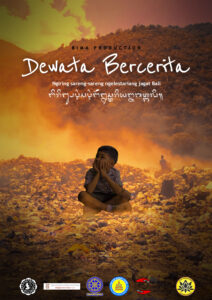 Climate change is a threat to the world. Waste is one of the factors causing climate change. Waste that is not handled properly has the potential to produce methane gas which affects the atmosphere. Bali, as the world’s leading destination, is still facing the challenge of climate change, one of which is caused by waste. Mounting piles of rubbish in landfills pose a threat to climate conditions.
Climate change is a threat to the world. Waste is one of the factors causing climate change. Waste that is not handled properly has the potential to produce methane gas which affects the atmosphere. Bali, as the world’s leading destination, is still facing the challenge of climate change, one of which is caused by waste. Mounting piles of rubbish in landfills pose a threat to climate conditions.However, there is a glimmer of hope when various movements or concrete actions are carried out by organizations, communities, foundations and individual behavior to tackle waste. Based on his concern for the environment, Adi Purnawan, who also works as a lecturer, took the initiative to build a waste bank in the Gang Nusa Indah area of Kuta Traditional Village, not far from the airport. This waste bank, called Simalu, has succeeded in inviting around 30 households to sort their waste. The waste that residents save will be converted into rupiah and every 6 months, residents usually withdraw their savings balance for holiday needs. Currently, Adi Purnawan’s waste bank can only handle non-organic waste that can be recycled.
The next waste handling movement was carried out by the Padang Tegal Traditional Village, Ubud-Bali. Padang Tegal Ubud Traditional Village, has a business (owned by the village) called Padang Tegal Compost House. The Padang Tegal Compost House, which is located in the Monkey Forest Central Parking area, provides segregated waste transportation services within the village environment, for both households and business owners. Padang Tegal Traditional Village has a well-functioning system for handling waste. Padang Tegal Village has a regulation that requires local communities/businesses to sort waste. “If it is not sorted, then the waste will not be transported,” said Ivena as the management team of the Padang Tegal Compost House.
Bali, as a world tourism destination, has a variety of tourist attractions. one of them is culinary tourism. Various café businesses, restaurants, food stalls, both providing local and world dishes, exist in Bali. There is a foundation called Plastik Detox which aims to educate small businesses (cafes, stalls, restaurants) to become environmentally friendly business places. Sri Junantari explained that Plastik Detox collaborates with business actors to reduce the use of single-use plastic and provide alternative solutions and help build a better business image.
Good waste management must start from the upstream. One of them is in the household environment. Evie, who also works as a Balinese dance artist, has implemented sorting and reducing the use of plastic, starting from her own home. According to Evie, people are still reluctant to sort their waste, because the waste that has been sorted is mixed again by transportation officers. “Communities will move to manage their waste, if there is a village system that works well, such as Padang Tegal Ubud village,” explained Evie.
